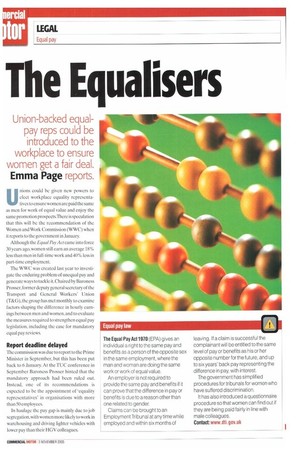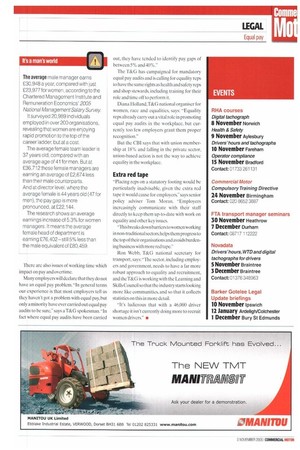The Equalisers
Page 38

Page 41

If you've noticed an error in this article please click here to report it so we can fix it.
Union-backed equal pay reps could be introduced to the workplace to ensure women get a fair deal.
Emma Page reports.
Unions could be given new powers to elect workplace equality representatives to ensure women are paid the same as men for work of equal value and enjoy the same promotion prospects.There is speculation that this will be the recommendation of the Women and Work Commission (WWC) when it reports to the government in January.
Although the Equal Pay Act came into force 30 years ago, women still earn an average 18% less than men in full-time work and 40% less in part-time employment.
The WWC was created last year to investigate the enduring problem of unequal pay and generate ways to tackle it. Ch aired by Baroness Prosser,former deputy general secretary of the Transport and General Workers Union (T&G), the group has met monthly to examine factors shaping the difference in hourly earnings between men and women, and to evaluate the measures required to strengthen equal pay legislation, including the case for mandatory equal pay reviews.
Report deadline delayed
-the commission was due to report to the Prime Minister in September, but this has been put back to 6 January. At the TUC conference in September Baroness Prosser hinted that the mandatory approach had been ruled out. Instead, one of its recommendations is expected to be the appointment of 'equality representatives' in organisations with more than 50 employees.
In haulage the pay gap is mainly due to job segregation, with women more likely to work in warehousing and driving lighter vehicles with lower pay than their HGV colleagues. There are also issues of working time which impact on pay and overtime.
Many employers will declare that they do not have an equal pay problem. "In general terms our experience is that most employers tell us they haven't got a problem with equal pay, but only a minority have ever carried out equal pay audits to be sure," says a T&G spokesman. -In fact where equal pay audits have been carried out, they have tended to identify pay gaps of between 5% and 40%."
The T&G has campaigned for mandatory equal pay audits and is calling for equality reps to have the same rights as health and safety reps and shop stewards, including training for their role and time off to perform it.
Diana 1-lolland,T&G national organiser for women, race and equalities, says: "Equality reps already carry out a vital role in promoting equal pay audits in the workplace, but currently too few employers grant them proper recognition."
But the CBI says that with union membership at 18% and falling in the private sector. union-based action is not the way to achieve equality in the workplace.
Extra red tape
"Placing reps on a statutory footing would be particularly inadvisable, given the extra red tape it would cause for employers," says senior policy adviser Tom Moran. -Employers increasingly communicate with their staff directly to keep them up-to-date with work on equality and other key issues.
This breaks down barriers to women working in non-traditional sectors. helps them progress to the top of their organisations and avoids burdening business with more red tape."
Ron Webb, T&G national secretary lOr transport, says: -The sector. including employers and government, needs to have a far more robust approach to equality and recruitment, and the T&G is working with the Learning and Skills Council so that the industry starts looking more like communities, and so that it collects statistics on this in more detail.
-It's ludicrous that with a 46,000 driver shortage it isn't currently doing more to recruit women drivers." •










































































































































































































